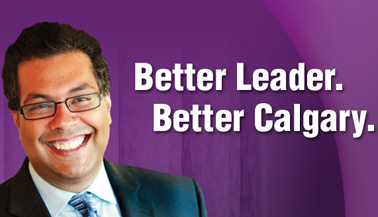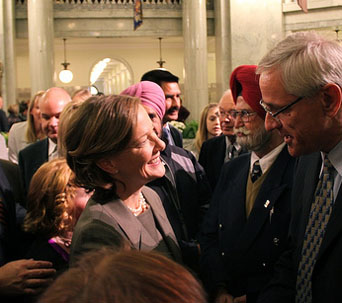So far the biggest impact of PM Harper’s success in Ottawa has been in Alberta?
Oct 25th, 2011 | By Citizen X | Category: Canadian Provinces For those who still think the Central Canadian mind is worth pondering, two somewhat contradictory recent Globe and Mail opinion columns on the current state of Canadian federal politics are probably worth a bit of further attention : John Ibbitson’s “Harper’s moment to entrench Conservative politics has arrived,” in yesterday’s print edition, followed promptly today by Lawrence Martin on “Higher taxation is back on the table.”
For those who still think the Central Canadian mind is worth pondering, two somewhat contradictory recent Globe and Mail opinion columns on the current state of Canadian federal politics are probably worth a bit of further attention : John Ibbitson’s “Harper’s moment to entrench Conservative politics has arrived,” in yesterday’s print edition, followed promptly today by Lawrence Martin on “Higher taxation is back on the table.”
Very crudely, these two in some ways quite fine examples of the mainstream pundit’s craft wind up speaking first for the new Harper Conservative majority government now in office (Ibbitson, of course), and then for the equally new official opposition New Democrats (with only one hasty allusion to the once so masterful “Grits” – and the author here is of course Lawrence Martin)
 To me at least, in the end neither piece is all that convincing, despite assorted other strong virtues. And at least one key reason, I think, is that Canada writ large – even in its component regional parts, with special reference to the last best wild west – really does not conform to the kinds of assumptions that would make either Stephen Harper’s ostensibly pristine right-wing or Brian Topp’s aggressive left-wing ideological vision (or whoever finally wins the gathering NDP leadership race) a serious guide to political reality, down on the ground, where the rubber hits the road, etc, etc.
To me at least, in the end neither piece is all that convincing, despite assorted other strong virtues. And at least one key reason, I think, is that Canada writ large – even in its component regional parts, with special reference to the last best wild west – really does not conform to the kinds of assumptions that would make either Stephen Harper’s ostensibly pristine right-wing or Brian Topp’s aggressive left-wing ideological vision (or whoever finally wins the gathering NDP leadership race) a serious guide to political reality, down on the ground, where the rubber hits the road, etc, etc.
Part of what I’m thinking here may have something to do with the between-the-lines fact that I have recently returned from lunch with two semi-retired leading luminaries of Ontario government and politics. (And I should confess that I am more or less semi-retired myself, though far from a leading luminary in any real-world arena.)Â But a more important part applies in both official languages, in all regions of what Mackenzie King called our “too much geography,” and even in the most ancient native traditions of what sections 25 and 35 of the Constitution Act 1982 call “the aboriginal peoples of Canada.”
 Part of the ultimate Central Canadian proof here is that Dalton McGuinty lives on as Ontario Premier, albeit with a mere “major minority” government. (And the other part, if you like, is the 59 NDP MP s from Quebec in the 41st Canadian federal Parliament, elected this past May 2.)
Part of the ultimate Central Canadian proof here is that Dalton McGuinty lives on as Ontario Premier, albeit with a mere “major minority” government. (And the other part, if you like, is the 59 NDP MP s from Quebec in the 41st Canadian federal Parliament, elected this past May 2.)
But the most intriguing broader proof almost certainly lies in the argument that the biggest impact of Stephen Harper’s success in Ottawa is not in Ottawa itself. Some of us at any rate may be pardoned for believing that Mr. Harper’s greatest achievements to date have been the election of Naheed Nenshi as Mayor of Calgary, and the election of Alison Redford as leader of the Alberta Progressive Conservative Party, and new Premier of Canada’s Wild Rose Province. (And note that Mayor Nenshi placed second in a recent popularity poll “ that looked at Canada’s 15 largest cities,” while Mr. Harper’s friend, Mayor Ford of Toronto, placed second last!)
 Or, as one of the leading luminaries at lunch put it: “we’re centre left – and more centre than left.” (And this reminds me of the “traditions” personified by Ontario’s longest-lasting premier, according to his most recent biographer: “strict public morality, competent, businesslike administration, and cautiously progressive social and economic policies in substantial harmony with the ideals of the people.”)
Or, as one of the leading luminaries at lunch put it: “we’re centre left – and more centre than left.” (And this reminds me of the “traditions” personified by Ontario’s longest-lasting premier, according to his most recent biographer: “strict public morality, competent, businesslike administration, and cautiously progressive social and economic policies in substantial harmony with the ideals of the people.”)
Why we in the true north strong and free are quite so profoundly attached to this kind of cautious progressive political culture is a question we also discussed at lunch, without coming to a conclusion. Back at the office, and as a fellow traveller on the recent trip down south organized by this website’s Northern California sponsors, it struck me that our rugged northern climate in our rugged northern geography – which affects all regions, in both official languages and beyond – probably has something to do with the answer. At any rate, all political thought of this sort does suggest that the real long-term future of the new more polarized right-left federal scene that is supposed to be what we have in Ottawa nowadays remains quite significantly in doubt.


As an Alberta resident, I should also point out that we as Albertans are just as capable of being centrist or even swinging to the left every now and again if we feel it’s in our best interests. To wit:
-For all our decrying of the long gun registry, I have yet to meet an Albertan who favours dismantling the handgun registry along with it. Every single long gun registry critic I’ve asked about this has been in favour of keeping the handgun registry.
-When the Supreme Court ordered Alberta to write gay rights into its human rights code, there was a swell of outrage from the devoutly conservative Alberta Report crowd, who demanded that Premier Ralph Klein use the notwithstanding clause to overturn the decision. Klein refused to do so, and the issue…well…just died out.
-Preston Manning speaking at a sustainability conference in Cochrane, the heart and bedrock of Conservative country in Alberta, about how Albertans need a “wakeup call” on the environment, to say nothing of the fact that he supports putting a price on carbon;
-The fact that we’re the only province to create institutions specifically for our Metis population, as opposed to just lumping them in with First Nations people, which does them a disservice;
-The widespread demand for us to have more of our bitumen upgraded locally when the market, if left by itself, would have exported all the raw material south, showing that we can be economically nationalist too;
-The recent debate over how much the oil companies have to pay in royalties, based on a review panel that Klein convened due to public demand. Would he have really done it if the Liberals and the NDP were the only ones calling for it?
-Danielle Smith’s promising that a Wildrose government would respect the Canada Health Act if she were elected;
-Specific tax breaks and programs to help stimulate the oilpatch and create more jobs than would exist if everything was left up to the market on its own;
-The uproar against Klein’s proposed “Third Way” health reforms and his proposal to cut social support to severely handicapped reisdents;
I could go on, but these are all examples of how Alberta fits quite well into what Citizen X describes here. Sure, Alberta is the most conservative province in the country, but like every other part of Canada we have a strong streak of centrism running through our culture, which takes us back to the centre when we feel the need to.